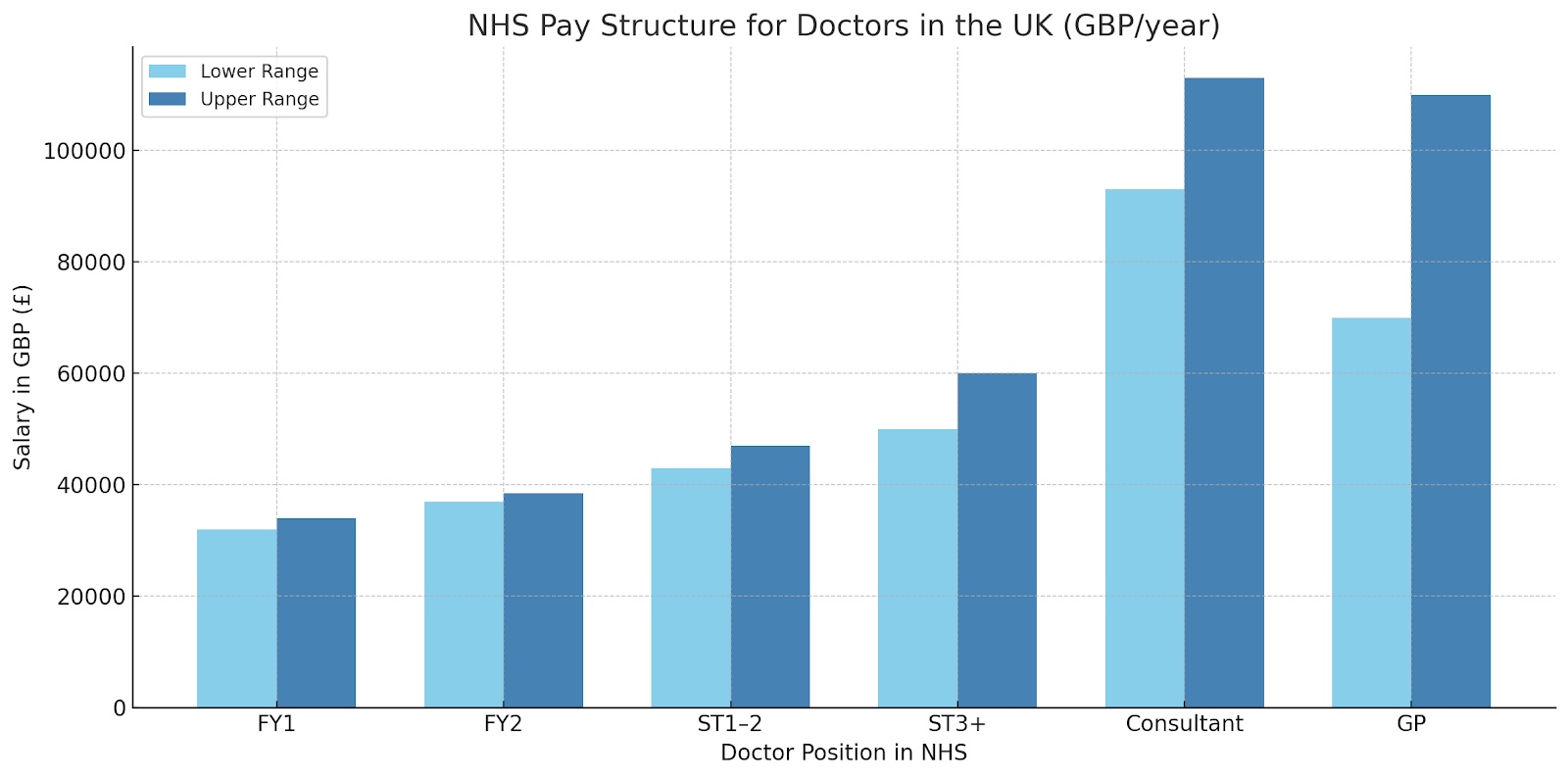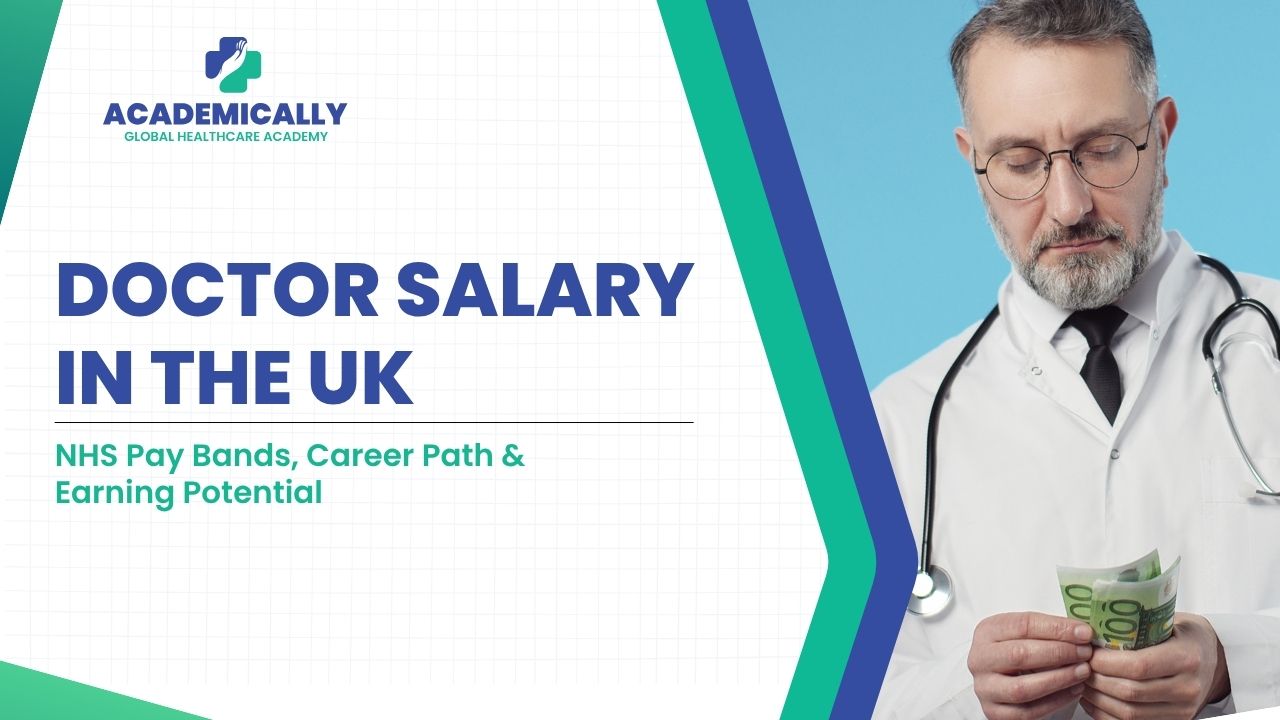Did you know… doctors in the UK earn INR 62 Lakhs a year! Yes, you read it right. Doctors in the UK earn a lot.
Moving to the United Kingdom is a dream for many doctors. The reason is good work-life balance and awesome pay.
But the truth is, NHS salaries can be a bit tricky to understand at first. There are different pay bands, night shift allowances, London weightings, and more. Plus, your pay can vary depending on where you work and how far you’ve progressed in your career.
In this blog, we will break down all you need to know about the salary for foreign doctors, explain the NHS pay bands, and show you how your career can grow in the UK healthcare system.
NHS Pay Structure for Doctors in the UK
Doctor salaries in the UK are determined by the NHS pay scale. It increases with seniority, specialty, and experience.
| Position | Base Salary (GBP/year) | In Indian Rupees (INR) | Typical for PLAB IMGs? |
| Foundation Year 1 (FY1) | £32,000 – £34,000 | ₹34–36 lakhs | Yes |
| Foundation Year 2 (FY2) | £37,000 – £38,500 | ₹39–41 lakhs | Yes |
| Specialty Training (ST1–2) | £43,000 – £47,000 | ₹45–51 lakhs | With Training |
| ST3+ (Senior Registrar) | £50,000 – £60,000 | ₹53–65 lakhs | Later |
| Consultant | £93,000 – £113,000+ | ₹1.01 – 1.23 crore+ | Long-Term Goal |
| General Practitioner (GP) | £70,000 – £110,000+ | ₹76 lakhs – 1.2 crore | Optional Path |

What Are NHS Pay Bands?
In the NHS, pay bands (or banding supplements) are additional payments on top of your basic salary. These are based on extra hours, workload, and how far it is.
These are often called “banding” supplements, and they can increase your salary by 20–50% or more, depending on the rota.
Key Elements That Affect Banding:
- Band 1A / 1B / 1C (older system): You can easily find these in the 2016 contract reforms for junior doctors in England. Some Trusts may still refer to these in informal terms.
- Band 1A: ~50% salary uplift
- Band 1B: ~40%
- Band 1C: ~20%
(These are less commonly used now under the 2016 contract.)
- London Weighting: Extra £2,000–£3,000/year for working in London.
- Known officially as the London supplement.
- Applied on top of base pay and banding.
- Rota Intensity: It increases based on your working schedule. If you have worked fo rmore hours then, the salary would increase.
Still not sure how this works?
Specialist Salary Breakdown (Post-PLAB Route)
Once you progress beyond foundation years and enter specialty training (ST3 and above), your salary can vary depending on your chosen field. Here’s what specialists typically earn in the UK:
| Specialty | Average Salary Range | In INR (Approx.) |
| Radiology | £95,000 – £130,000 | ₹1.03 – 1.41 crore |
| Surgery (General/Ortho) | £100,000 – £135,000 | ₹1.08 – 1.46 crore |
| Psychiatry | £90,000 – £120,000 | ₹98 lakhs – 1.3 crore |
| Emergency Medicine | £85,000 – £115,000 | ₹91 lakhs – 1.24 crore |
| Anaesthetics | £90,000 – £125,000 | ₹98 lakhs – 1.35 crore |
| Paediatrics | £85,000 – £115,000 | ₹91 lakhs – 1.24 crore |
| General Practice (GP) | £70,000 – £110,000 | ₹76 lakhs – 1.2 crore |
What affects the salary of a doctor in the UK?
Here’s what affects how much you’ll actually take home:
- Location: London means more pay, but higher costs
- Branch/Specialisation: Surgery, Radiology, Psychiatry often have higher salaries
- Rota Pattern: More night/weekend shifts means more income
- Experience: More UK/NHS experience means faster promotions
- Locum Work: Additional flexible shifts that can significantly boost earnings
Net Salary: What Do You Take Home After Tax?
Here’s a breakdown for an FY1 earning £33,000/year:
| Component | Amount/year | Notes |
| Gross Salary | £33,000 | NHS Base Pay |
| Income Tax | 3,500 | 20% on income above £12,570 |
| National Insurance | 2,300 | Compulsory deduction |
| NHS Pension | ~£2,100 | Auto-enrolled (opt-out allowed) |
| Net Take-Home Pay | ~£25,100 | ~£2,000/month |
UK vs Other Countries: Doctor Salary Comparison (2025)
| Country | Starting Salary (GBP Equivalent) | In INR (Approx.) | Entry Route | Ease for IMGs |
| UK | £32K – £38K | ₹33.9 – ₹40.3 lakhs | PLAB + GMC Registration | Easy |
| USA | £40K – £50K (Residency Pay) | ₹42.4 – ₹53 lakhs | USMLE Steps 1–3 + Match | Very hard |
| Germany | £42K – £55K | ₹44.5 – ₹58.3 lakhs | Approbation + B2 German | Medium |
| UAE | £50K – £60K | ₹53 – ₹63.6 lakhs | DHA | Easy |
| Australia | £45K – £55K | ₹47.7 – ₹58.3 lakhs | AMC Part 1 & 2 | Easy |
Also Read:
How To Become a Doctor in the UK?
The salaries sound great of course, but the next question that comes up is ‘How to become a doctor in the UK’.
To become a doctor in the UK, the first thing you have to do is clear the PLAB exams.
PLAB stands for Professional and Linguistic Assessments Board. It is a licensing exam for international medical graduates (IMGs) to work as registered doctors in the UK.
It consists of:
- PLAB 1 – A written exam (MCQs) assessing clinical knowledge.
- PLAB 2 – An OSCE-style practical exam assessing communication and clinical skills.
Need help in passing the PLAB exams? Join Academically’s PLAB Preparation Course. You will get live and recorded lectures, study materials, AI-based mock tests, personalised guidance and much more.
Once you pass both PLAB exams, you’re almost there. You will also need to meet the GMC’s requirements for internship and English language. That means passing either IELTS or OET. Once that’s done, you can apply for GMC registration. After that, it’s time to start looking for jobs, usually at Foundation Year 1 (FY1) or Foundation Year 2 (FY2) level.
What’s the Salary After PLAB?
Let’s break it down practically.
FY1 Doctor (Post-PLAB)
- Base Pay: £2,600–£2,900/month
- With Banding & Night Shifts: Up to £3,500/month
FY2 Doctor
- Base Pay: £3,100–£3,300/month
- With Extras: £4,000–£4,500/month
Career Growth Opportunities After PLAB
Foreign doctors in the UK can move up the ladder with time and training. Here’s a simplified roadmap:
Step 1: Foundation Training (FY1–FY2)
- Entry point for most PLAB candidates
- Build UK clinical experience
Step 2: Specialty Training (ST1–ST8)
- Competitive entry (after FY2)
- Salaries increase with each stage
Step 3: Become a Consultant
- Takes 6–8 years from FY1
- Salaries range from £93,000 to £113,000+
- Can work in private sector for extra income
Alternative: General Practice
- 3-year GP training
- Work independently
- Earn £70,000–£110,000+
What affects the salary of a doctor in the UK?
Here’s what affects how much you’ll actually take home:
- Location: London means more pay, but higher costs
- Branch/Specialisation: Surgery, Radiology, Psychiatry often have higher salaries
- Rota Pattern: More night/weekend shifts means more income
- Experience: More UK/NHS experience means faster promotions
- Locum Work: Additional flexible shifts that can significantly boost earnings
Is the PLAB Route Worth It?
Yes, the PLAB route is worth your time, money and effort.
Here’s why:
- Free healthcare
- Stable income
- Strong work-life balance
- Clear, structured career growth
- Opportunities in public + private sector
Do you have more questions about PLAB and salaries of an overseas doctor in the UK?






